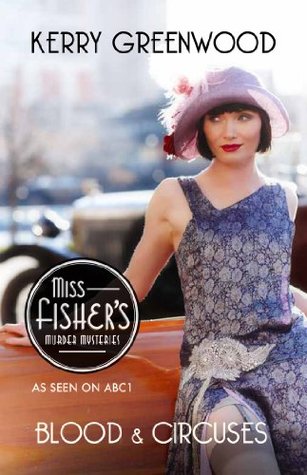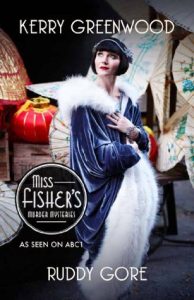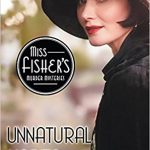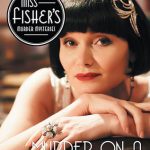 Blood and Circuses (Phryne Fisher, #6) by Kerry Greenwood
Blood and Circuses (Phryne Fisher, #6) by Kerry Greenwood Formats available: paperback, ebook, audiobook
Series: Phryne Fisher #6
Pages: 208
Published by Poisoned Pen Press on July 1st 2007
Purchasing Info: Author's Website, Publisher's Website, Amazon, Barnes & Noble, Kobo, Bookshop.org
Goodreads
Phryne Fisher is bored. Life appears to be too easy, too perfect. Her household is ordered, her love life is pleasant, the weather is fine. And then a man from her past arrives at the door. It is Alan Lee from the carnival. Alan and his friends want her to investigate strange happenings at Farrells Circus, where animals have been poisoned and ropes sabotaged. Mr. Christopher has been found with his throat cut in Mrs. Witherspoon s irreproachable boarding house and Miss Parkes, an ex-performer, is charged with his murder.Phryne must go undercover deeper than ever to solve the circus malaise. She must abandon her name, her title, her protection, her comfort, even her clothes. She must fall off a horse twice a day until she can stay on. She must sleep in a girls tent and dine on mutton stew. And she must find some allies.Meanwhile, in Melbourne, the young and fresh-faced policeman Tommy Harris has to solve his own mysteries with the help of the foul-spoken harridan Lizard Elsie, or Miss Parkes will certainly hang. Can Phyrne uncover the truth without losing her life?"
My Review:
There are two crimes to be solved in this story. Or is it three?
The first one is easy. Phryne begins the story feeling bored to death. Diving headfirst into solving the second crime takes care of that. If she doesn’t discover the perpetrator in time, she won’t be merely bored to death. She’ll just be dead.
But just as Phryne is screwing up her own courage, there’s a murder. And this one isn’t Phryne’s case. At all. At least at first.
Mr. Christopher has been found murdered in his bed at his boarding house. Nothing about this case is exactly as it appears. Not even the corpse.
Mr. Christopher was also Christine. He was a member of Farrell’s Circus, performing as the half-man/half-woman. The circus was the one place where his accident of birth afforded him some respect and a reasonable living. Mr. Christopher was a true androgene. He was born intersex, with both male and female sexual characteristics. He lived his life as Mr. Christopher, and that is how he shall be referred to.
Mr. Christopher’s death is a locked room mystery. And there is only one person in the boarding house who could possibly have entered his second-story room from the window. Miss Parkes, formerly known as Mrs. Fantocci, used to be a star performer in a circus trapeze act. She just got out of prison for murdering her disgusting, abusive husband ten years ago. Some of the police are all too ready to believe that a woman who has murdered before would all too easily murder again.
Jack Robinson is not so convinced. He may not be the Jack we’re used to from the TV series, but he is still a very good, and very fair, cop. Something in the setup does not make sense, and Jack has all sorts of suspicions – he just needs some facts to back them up.
Phryne, meanwhile, is off to Farrell’s Circus. Not as a paying customer, or even as a patron. She is undercover, posing as a trick rider. And all too frequently falling down as a trick rider. It’s not easy to stand up on a horse while it is moving.
It’s also not easy for Phryne to investigate while pretending to be the lowest person in the group and stripped of all her resources. She doesn’t understand how the circus community really functions, not nearly well enough to guess at what is making this particular community suddenly not function. She’s also not used to not being able to bully her way to a solution, whether that’s through her considerable charm or by an application of her considerable fortune.
Phryne suffers from a surprising amount of self-doubt. It’s refreshing to see her have to reach into herself and see what she is made of on the inside.
But Phryne is at Farrell’s because some old friends are afraid for their lives and their livelihood. Whether it’s a curse, an against-the-odds string of very bad luck, or an active conspiracy at work, someone or something is driving Farrell’s into the ground. And it’s up to Phryne to figure out the true source of all their woes, and bring it to a halt.
It seems as if Phryne and Jack are investigating completely different crimes that just coincidentally take place among the denizens of Farrell’s circus. But this string of crimes is bigger than either of them imagines.
And Phryne gets saved by a bear.
Escape Rating B: I bounced off of three books this week, and finally ended with Phryne as my comfort read. However, this may be the least comfortable of Phryne’s books so far. She takes herself far out of her own comfort zone, and finds herself lost, alone and more uncertain of herself than has been shown in the previous books.
That makes the beginning of this story a bit rough going. Phryne isn’t acting like Phryne, and part of the comfort in these stories is that same cast of characters and all of their interactions.
Something that always leaves me thinking at the end of one of Phryne’s adventures are the attitudes portrayed towards sex and sexuality throughout the series. Although the series is set in Australia in the 1920s, the first book was published in the 1990s and the book series is still ongoing, although the TV series is unfortunately in hiatus.
But both the era it portrays and the era is was written in have a profound effect on the ways that sex, whether that be sex roles, sexual activity, sexual preferences or anything else that touches on sex and gender and the morality supposedly belonging thereto are often dealt with in layers.
Phryne can, in some ways, be seen as ultra liberal, for multiple versions of that word. Like male detectives, Phryne has a lover in every port, and in every book. Sometimes more than one. She likes men, she likes sex, and she’s not remotely interested in serious relationships. This has been true for many male detectives over the entire history of the genre, but Phryne feels unique among women.
She also likes and respects everyone for who they are. She doesn’t pass blanket judgments on groups because of what society dictates. That includes whether the people she meets are gay or straight, cis or het, Australian or elsewise, communist or capitalist, and in the case of Blood and Circuses, vertically challenged or average height. Phryne judges people as she finds them individually.
At the same time, particularly in this book, other characters are used to voice the prejudices of society as a whole. The juxtaposition of Phryne’s views with that of conventional society is made clear without putting anything offensive in her mouth. But still portraying that in this era, attitudes were what they were. It’s a very useful way of not pretending that the past attitudes did not exist in all their disgustingness while also commenting on the possibility that at least some people thought otherwise even then.
 This is also the second book I’ve read recently that delves into 20th century circus life. (The other book was The Orphan’s Tale). In both cases, it’s hard to let go of the sad irony that in both stories the circus performers believed that the circus, as a concept and way of life, even if not their particular example of it, was strong and would go on forever, no matter what. Even in 1994 when Blood and Circuses was first published, that probably still seemed true. The reality that in 2017 the circus as they knew it is about to raise its very last big top gave this reader more than a touch of nostalgia.
This is also the second book I’ve read recently that delves into 20th century circus life. (The other book was The Orphan’s Tale). In both cases, it’s hard to let go of the sad irony that in both stories the circus performers believed that the circus, as a concept and way of life, even if not their particular example of it, was strong and would go on forever, no matter what. Even in 1994 when Blood and Circuses was first published, that probably still seemed true. The reality that in 2017 the circus as they knew it is about to raise its very last big top gave this reader more than a touch of nostalgia.
The circus may not be going on, but Phryne certainly is. The next time I need a comfort read, I know I’ll be pulling out Ruddy Gore.





















2 thoughts on “Review: Blood and Circuses by Kerry Greenwood”
Comments are closed.